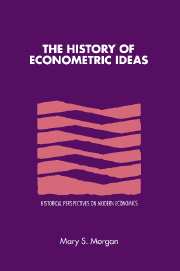Book contents
- Frontmatter
- Contents
- List of figures
- Preface
- Acknowledgements
- Introduction
- Part I Business cycles
- Introduction to business cycles
- 1 Sunspot and Venus theories of the business cycle
- 2 Measuring and representing business cycles
- 3 Random shocks enter the business cycle scene
- 4 Tinbergen and macrodynamic models
- Part II Demand analysis
- Part III Formal models in econometrics
- Conclusion
- References
- Index
3 - Random shocks enter the business cycle scene
Published online by Cambridge University Press: 26 October 2009
- Frontmatter
- Contents
- List of figures
- Preface
- Acknowledgements
- Introduction
- Part I Business cycles
- Introduction to business cycles
- 1 Sunspot and Venus theories of the business cycle
- 2 Measuring and representing business cycles
- 3 Random shocks enter the business cycle scene
- 4 Tinbergen and macrodynamic models
- Part II Demand analysis
- Part III Formal models in econometrics
- Conclusion
- References
- Index
Summary
The introduction to this book suggested that econometrics developed as a substitute for the experimental method in economics, and that the problems which arose were connected with the fact that most economic data had been generated in circumstances which were neither controlled nor repeatable. By using statistical methods, econometricians also obtained access to an experimental tradition in statistics. This tradition consisted of generating data artificially, under theoretically known and controlled conditions, to provide a standard for comparison with empirical data or to investigate the behaviour of data processes under certain conditions. Such experiments now form a significant part of the work in econometric theory (under the title Monte Carlo experiments) and are sometimes used in applied work (model simulations), but their use dates from the early years of econometrics. Experiments played a particularly important role in the work of the 1920s which is discussed here.
This chapter deals with technical issues of data analysis and associated explanations of the generation of economic cycle data as investigated by Yule, Slutsky and Frisch. The account begins with the work of Eugen Slutsky and George Udny Yule in the 1920s both of whom made considerable use of statistical experiments. Yule criticised the methods of analysing time-series data described in the previous two chapters. Slutsky explored the role of random shocks in generating cyclical patterns of data.
- Type
- Chapter
- Information
- The History of Econometric Ideas , pp. 73 - 100Publisher: Cambridge University PressPrint publication year: 1990



